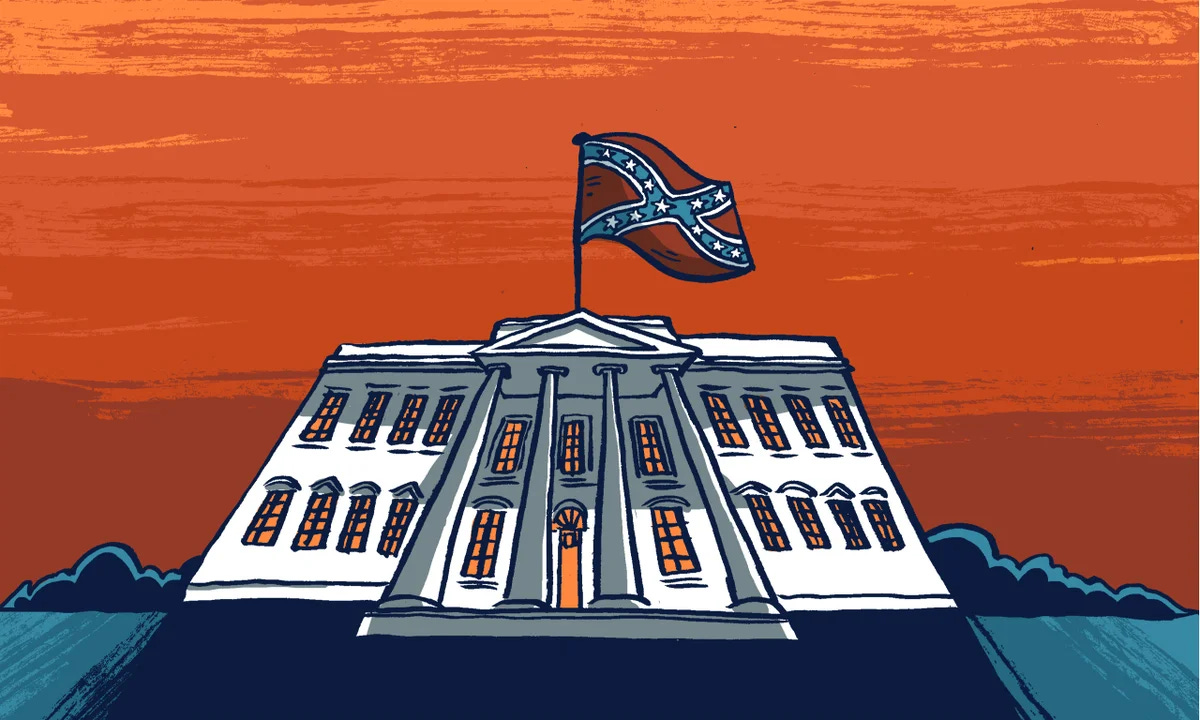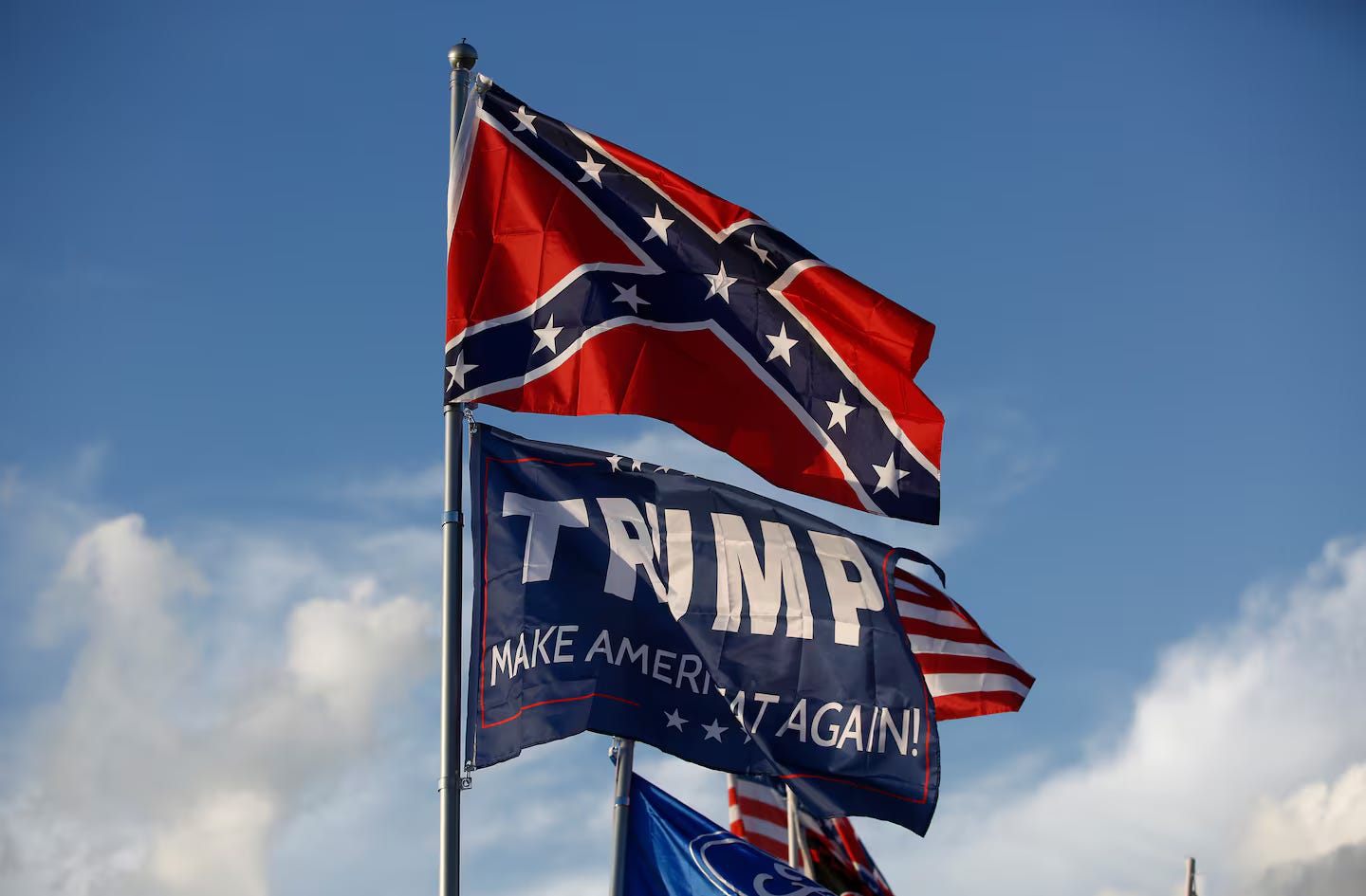You are excused if you thought otherwise.
After all, he has supported the public display of Confederate iconography, including flags and monuments. In 2017, Donald Trump described white nationalists, who gathered in Charlottesville, Virginia to defend a monument honoring Confederate general Robert E. Lee as “good people.”
And who can forget his recent explanation of Confederate defeat at Gettysburg, when he gave voice to Lee’s supposed warning: “Never fight uphill me boys!”
Then there are his supporters, many of whom fly the Confederate flag alongside their Trump flags at rallies or in front of their homes.
References to Trump as a ‘Confederate president’ or recent declarations that the ‘Confederacy won the presidential election’ can mean any number of things. They are typically made in reference to Trump’s outspoken racism, his support of white supremacists and xenophobia.
In short, it’s a way of attempting to explain our current situation and connect it to the past. Not only is it not helpful as an explanation, it pushes us further away from appreciating the clear ties to the recent and distant past.
First, it allows us to distance ourselves from assuming full responsibility for his rise and success. As an explanation, it pushes Trump’s historical origins into a corner, where we can wipe our hands from any responsibility. In doing so, we turn Trump and his followers into an abberation of American history, a temporary setback within the broader American story.
Trump’s embrace of white supremacy, his coddling of white nationalists certainly can be traced back to the Civil War, but let’s remember that racism preceded the war and as we all know it outlasted it as well. And it goes without saying that racism and racial violence has never been confined to the American South.
As a historian and student of history, equating Trump with the Confederacy sweeps the rest of American history under the table. There is no other period in our history that looms larger in our popular imagination than the Civil War. For that reason alone, we should be cautious of the ways and the frequency with which we invoke it.
Of course, there are lessons we can learn and connections that can be made to the present, but I rarely see people connect Trump to any other period in American history.
Over the past few years I’ve been reading a good deal about the evolution of the modern conservative movement and Radical Right. Here are just a few titles to get your started if you are interested in exploring this subject for yourself.
When the Clock Broke by John Ganz
One Nation Under God by Kevin M. Kruse
Taking America Back by David Austin Walsh
Partisans by Nicole Hemmer
Believe Me by John Fea
Bring the War Home by Kathleen Belew
Illiberal America by Steven Hahn
A Great Disorder by Richard Slotkin
The point here is that there are many more fruitful histories to consider in trying to understand our current political and cultural climate and they have little directly to do with the Civil War.
Finally, the reference to Trump as a ‘Confederate president’ smacks of fatalism. It reminds me of people who argue that we are ‘still fighting the Civil War’ or ‘the Civil War never ended.’ This approach to the past collapses history and admits not only that we haven’t witnessed significant change since the Civil War, but that it is impossible.
I certainly understand this sentiment right now, but it has little to do with any serious appreciation of our past. We should do our best to resist it.
I have a feeling that we are going to have a number of opportunities to explore the legacy of the Civil War era over the next few years. Admittedly, this is not one of my biggest concerns given what we are likely to experience over the next four years, but I promise to step up and do my best to offer insight when the time comes.
Take care, everyone and thanks again for taking the time to read.
Here is a bonus pic of Otis for those of you who need it.








If the question you are asking at the end of this piece indicates you are thinking about stopping please do not. I for one think there is value in your writing and observations. The historical profession, especially public historians, needs to recognize , as I think you keep saying, that there is value to the study of Confederate history. These people were a part of our national past and we need to understand them as we need to understand the other who came before us. Also, your thoughts and writings give me a touchstone against which to lay my own thoughts and some writing on most of the same subjects. I think you are a skilled historian and I for one would miss you if you stopped doing this.
I watched the election returns with the expectation that American voters had surely been listening & had turned out in great numbers to cast aside vicious attacks against woman's rights, decent behavior & mutual respect for people of every persuasion. I struggled to make sense of what I was watching. Since then, I have vacillated between seeking a new - & foreign residence - to multiplying my efforts to turn the tide against ignorance of the truth. Thank you, Kevin, for adding a supportive & thoughtful voice to our 'new' lives. Thank you for giving me one more reason to renew my resolve to be part of America's solution.